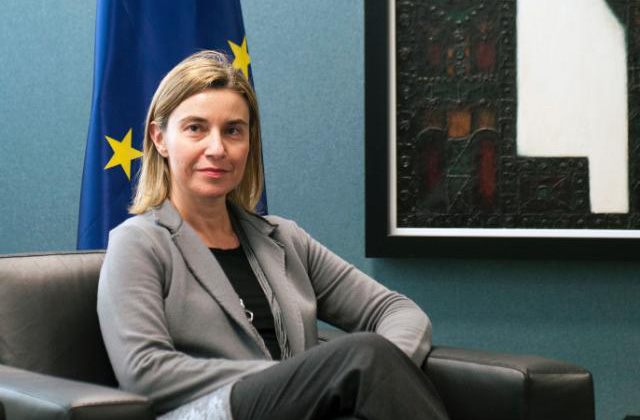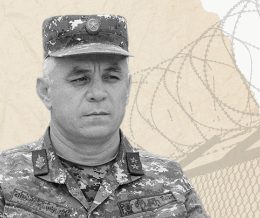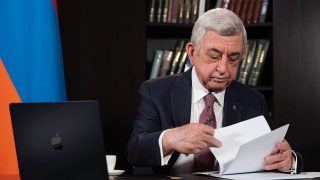
New Situation will Obviously Impact the Future Level of Economic and Trade Cooperation between the EU and Armenia: Exclusive Interview of 168.am with F.Mogherini

Federica Mogherini, EU High Representative for Foreign Affairs and Security Policy, will visit Armenia on March 1 upon invitation of Edward Nalbandyan, RA Minister of Foreign Affairs. 168.am had an exclusive interview with the High Representative on agenda of her visit to Armenia, Armenia-EU relations, new negotiated accord, NKR conflict and many other issues.
-After a two-year crisis in Armenia-EU relations, new round of Armenia-EU talks has already started. You are going to visit Armenia during this new stage after Ukrainian conflict, which discovered many problems and aspects that hadn’t been taken into consideration while designing the EaP program, one of which was Russia’s influence in EU’s Eastern Neighbourhood. What kind of lessons did the EU learn from recent developments and with what kind of suggestions or agenda are you going to visit Armenia?
-The Eastern Partnership has always been a joint initiative and has always been shaped by both the European Union and its six partner countries, including Armenia. It is together with all six partners that we have agreed at our last summit in Riga on four key priority areas of cooperation, focussing on ways to strengthen the resilience of our partner countries. Some of our partners have chosen to pursue close political association and economic integration with the EU. Others have a different approach. The EU welcomes these sovereign choices that each of our partners, including Armenia, is making. What we have done and what we will continue to do is to support the strengthening of democratic institutions and good governance, provide market opportunities for businesses in Armenia and in the EU, enhance interactions and contact between our citizens in a variety of settings, and to foster energy and transport interconnections, thereby bolstering our partners’ ability to withstand any pressures they may be facing. I have seen Armenia’s commitment to strengthen its cooperation with the EU, both in Riga and since, in our multilateral meetings in the framework of the Eastern Partnership and bilaterally as we work towards a new agreement. This commitment is shared by the EU, and we provide significant financial and technical support aimed at improving the lives of Armenian citizens. The message I will take with me to Yerevan is simple: let us build on the momentum we have gained over the past year and jointly shape a positive agenda for our future cooperation with our mutual interests firmly in mind.
– Parties have started negotiations to form a new comprehensive political and economic agreement. It is obvious that Armenia is limited to develop economic and trade relations with the EU, but there is an information that new document will have an economic component too. To your mind, how or to what extent does Armenia’s membership to the EEU block the development of Armenia- EU economic relations? How will the new document look like? Can we talk about economic relations too?
-Membership of the Eurasian Economic Union (EEU) in itself is not an obstacle for Armenia’s cooperation with the EU. Let me recall that the EU and Armenia have completed a scoping exercise prior to the launching of negotiations to see how far our cooperation can go in this new context. Integration with the Eurasian Economic Union does, however, pose trade challenges, notably because EEU members, including Armenia, have transferred their sovereignty on tariff matters and other key commercial policies to the Eurasian Union level and therefore are not able to conduct and implement any autonomous bilateral trade policy, for example by signing new Free Trade Agreements. This new situation will obviously impact the future level of economic and trade cooperation between the EU, but our level of ambition for this part of the agreement, as with the others, remains high.
– Recently Luc Pierre Devigne, Head of the Directorate General for Trade of the European Commission, said. “This time don’t be afraid – do sign the negotiated agreement”. This means that the EU officials think Armenia was afraid of signing AA or Armenia was frightened. Taking into consideration this fact, is EU going to give more objective guarantees to Armenia to insure the future risks in Armenia-EU relations? What kind of security guarantees can EU suggest to Armenia if it is possible?
-We have always been clear that it is for our Eastern Partners to decide what relationship with the EU is the best for them. Sovereign nations have the right to determine their own futures, to shape their own policies, and to decide their own pathways, in the interest of their people. The basis of any strong partnership is respect. The recent review of the European Neighbourhood Policy (ENP) focuses the policy on enhancing the stability and resilience of all of our partner countries, regardless of their level of integration or political association with the EU. It is only natural that security has been given a stronger role in the ENP in order to increase the region’s resilience against threats, because we live in a far more dangerous and difficult world today. The EU’s support to all of our Eastern Partners has been and will continue to be unwavering.
– It is well-known that NK unresolved conflict is the melting point of Armenia. Armenia is dependent from Russia in security sphere, which is a tool in hands of Russia, as many experts insist. Taking into consideration revised Neighbourhood policy, can Armenia hope to have support from the EU in this sphere too?
-When it comes to the Nagorno-Karabakh conflict, our position is well-known: there must be a peaceful resolution of the conflict and we will continue to support the Minsk Group and its Co-Chairs in their endeavours to help find a solution. But both sides must understand that there is no military solution and the current status quo is unsustainable. The EU has been consistently calling for restraint and for further engagement from both sides in the OSCE-led negotiation efforts. We also financially support concrete confidence-building activities, which complement the OSCE’s efforts. Moreover, and as I said before, security will be given a stronger role in the revised European Neighbourhood Policy, building on a thorough analysis of instability factors in each of the countries concerned. This will open new areas of cooperation, including conflict prevention, counter terrorism and anti-radicalisation, and security sector reform.
–And finally our last question. Piotr Switalski, Ambassador, Head of the EU Delegation in Yerevan, urged the Armenian authorities to properly investigate “credible” allegations of fraud voiced by the opposition, independent observers and media. How will Armenian authorities respond to these calls effect on Armenia-EU future relations? I am asking because Armenia’s opposition is sure that authorities are not going to investigate.
-A transparent investigation of all alleged frauds is vital in order to increase the confidence in, and the integrity of, electoral processes in Armenia. Appropriate measures must also be taken if these allegations of fraud are confirmed. The EU welcomed the OSCE/ODIHR Referendum Expert Team’s Final report of 5 February 2016, and we share the observations and recommendations made in the report as well as those made previously, which are still to be addressed. The reform of electoral legislation should be carried out in an inclusive manner and all stakeholders are encouraged to make every reasonable effort to build broad consensus. Building on efforts by the authorities to improve public confidence, an agreement should be found on the most critical issues and next year’s parliamentary elections should already benefit from better safeguards and reinforced legitimacy.
By Araks Martirosyan























